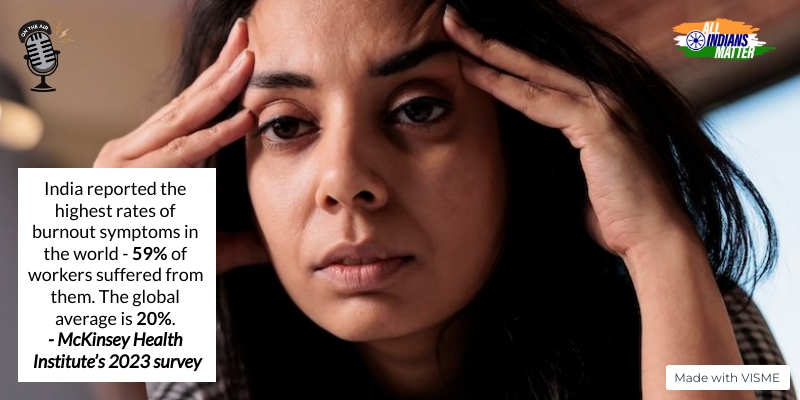Ashraf Engineer
January 6, 2024
EPISODE TRANSCRIPT
Hello and welcome to All Indians Matter. I am Ashraf Engineer.
Recently, two merchant ships bound for our shores and carrying Indian crew members were hit by drones. This happened as maritime tensions rose in the aftermath of the Israeli genocide in Palestine. A Gabon-flagged oil tanker, MV Saibaba, with 25 Indian crew members, came under a drone attack in the Red Sea. The Israel-linked merchant ship, MV Chem Pluto, with around 20 Indian crew members, was hit by a drone 217 nautical miles off the Porbandar coast. The attacks were suspected to have been carried out by Yemen’s Houthi rebels who are striking ships as revenge on Israel for its military campaign in Gaza. The attacks forced the world’s biggest shipping firms to suspend passing through one of the world’s most important maritime trade routes, which in turn could negatively impact the global economy. The Houthis are backed by Iran and it is feared that their sea attacks could escalate Israel’s genocide into a wider regional conflict. Who are the Houthis and what are they aiming to achieve through drone attacks on ships?
SIGNATURE TUNE
While the Houthis do not fight alongside Hamas in Palestine, their targeting of merchant vessels is aimed to inflict pain on Israel and its allies. The patch of the Red Sea that the Houthis are focusing on is critical to the world’s economy. It’s a narrow stretch that runs from the Bab-el-Mandeb straits off the coast of Yemen to the Suez Canal in northern Egypt. Through this stretch flows 12% of world trade and 30% of global container traffic.
Any disruption could cause economic disruption across the world. You might recall that in 2021, a ship called the Ever Given ran aground in the Suez Canal, blocking it for almost a week. It held up $10 billion in cargo each day and disrupted global supply chains for months.
It is feared that the Houthi drone and missile attacks on commercial vessels, almost daily occurrences since December 9, 2023, could shock the world economy even more than the marooning of the Ever Given.
We have already witnessed the start with four of the world’s five major shipping firms – Maersk, Hapag-Lloyd, CMA CGM Group and Evergreen – deciding to pause shipping through the Red Sea. Oil major BP followed suit, leading to a rise in oil and gas prices.
The alternative routes, which would add 14 to 15 days to the voyages, would take ships around Africa and send insurance premiums skyrocketing. Companies would pass on these higher costs to consumers, spurring inflation further at a time when the world is struggling to contain it in the wake of the COVID-19 pandemic and the Russian invasion of Ukraine.
It would amount to an economic attack on Israel’s allies, who the Houthis hope will pressure Israel to end its genocide. The Houthis, on their part, have said they will stop only when Israel allows food and medicine into Gaza.
There could be a more selfish political aim too. The Houthis are seeking to control northern Yemen and championing the Palestinian cause could help them gain legitimacy at home and in the region. That would mean an advantage against Saudi Arabia and the United Arab Emirates, who they say are puppets of the US and Israel.
The Red Sea attacks began soon after the start of the Israeli campaign in October, with the Houthis saying they would target any ship bound for Israel. However, it’s not clear that all the ships they’ve attacked were going there.
The US has responded with an international naval operation to protect maritime trade, with the UK, Canada, France, Bahrain, Norway and Spain joining it.
So, who are the Houthis?
They are a militarised group drawn from a sub-sect of Yemen’s Shia Muslim minority, the Zaidis. The group takes its name from its founder, Hussein al Houthi. It was formed roughly 30 years ago in response to the allegedly corrupt regime of then-president, Ali Abdullah Saleh.
Saleh, backed by Saudi Arabia, tried to eliminate the Houthi rebels in 2003, but the Houthis managed to fend them off.
The Houthi rebels have been fighting a full-blown civil war since 2014 against Yemen’s government, which is backed by Arab countries led by Saudi Arabia and the UAE. By the start of 2022, the civil war had claimed more than 377,000 lives and displaced four million people, according to the UN.
The Houthis say they are part of the Iran-led ‘axis of resistance’ against Israel and the US, along with Hamas and Hezbollah, the latter being a Shia armed group in Lebanon. Hezbollah, in fact, served as the template for the Houthis and has been providing them with training since 2014.
The US says Iran is supplying the rebels with the weapons being used to target commercial shipping. Iran, of course, denies this.
The US and Saudi Arabia also claim that Iran supplied the ballistic missiles that the Houthis fired at the Saudi capital, Riyadh, in 2017, but which were shot down. Saudi Arabia blamed Iran for supplying the cruise missiles and drones that the Houthis used to attack its oil installations in 2019.
The Houthis have fired thousands of short-range missiles into Saudi Arabia and attacked targets in the UAE. They have also fired ballistic missiles and drones at Israel.
As of today, a majority of Yemen’s population lives in areas under Houthi control. This includes the capital Sanaa as well as most of the Red Sea coast. The UN Security Council said that the group collects taxes and prints currency.
The official government is the Presidential Leadership Council, to which President Abdrabbuh Mansour Hadi transferred power in April 2022, but it has been based in exile in Riyadh since 2015.
The maritime attacks could be intended also to draw more countries into the Israel-Hamas conflict. Israel has already said it would act against the Houthis if the international community does not.
The Indian Navy, on its part, deployed three guided missile destroyers in the Arabian Sea after the attacks. India is also using long-range maritime patrol aircraft in the region.
The Navy deployed P-8I long-range patrol aircraft for surveillance, and warships INS Mormugao, INS Kochi and INS Kolkata to maintain a “deterrent presence”.
Experts say the Red Sea attacks make for a new generation of geopolitical threats. While the naval task force led by the US would make a difference, it won’t be able to effectively secure the entire area. So, as long as there are significant numbers of merchant ships passing through, the Houthis will have targets. The threat could remain so long as the Israeli genocide continues in Gaza.
While the economic impact in the short term will most likely be limited, it would grow if the attacks continue. It is estimated that each year there are 35,000 vessel movements primarily trading between Europe, the Middle East and Asia in the Red Sea, accounting for roughly 10% of global GDP. If the threat persists, countries in these regions could see significant economic impact. If shipping companies refuse to carry cargo to Israel, its economy would be seriously affected too.
The thing about a threat is that it doesn’t always need to be carried out. Its spectre is enough to cause the disruptions sought. So long as the Houthi threat to shipping remains, so does the threat to the world’s economy.
Thank you all for listening. Please visit allindiansmatter.in for more columns and audio podcasts. You can follow me on Twitter at @AshrafEngineer and @AllIndiansCount. Search for the All Indians Matter page on Facebook. On Instagram, the handle is @AllIndiansMatter. Email me at editor@allindiansmatter.in. Catch you again soon.






